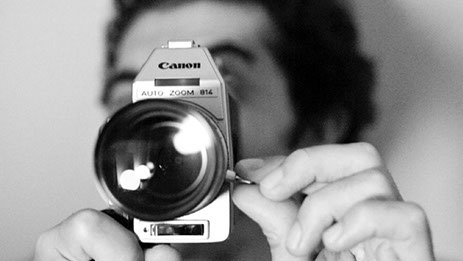"I fell in love with the cinema in my teens and am still paying for it"
 02-20-2019 | tagged
02-20-2019 | tagged  cineme revolution,
cineme revolution,  interview,
interview,  mohannad ghawanmeh |
mohannad ghawanmeh |  Post a Comment |
Post a Comment |  Email Article |
Email Article | An Interview by Kitty Aal, originally posted on Cinema Revolution Society
Cinema Revolution Society interviews Mohannad Ghawanmeh, a film scholar and cineaste who has produced, acted in, curated for, written about, and lectured on film. His expertise is focused on Arab cinema, but also thoroughly extends into silent cinema, non-fiction cinema, transnational cinema, religious cinema, and more. Mohannad is a PhD candidate in Cinema and Media Studies in the University of California, Los Angeles and a 2017/18 fellow in the American Research Center in Egypt. His dissertation investigates the political economy of silent cinema in Egypt, 1896–1932.
CRS: Tell me about a particularly beautiful memory you have of watching a film (any film) in sensual (not analytical) terms - what, where, when, with who...?
M: Hmm, well the first date I went on with my spouse involved our watching the three-hour Metropolis.This was to the version augmented with footage found in a print uncovered in Argentina, as I remember, not long before we went to see it in 2010. I had to see the newly restored version, of course, considering that Lang was and probably still is my favorite director of all, especially since I had learned that it it was only a few minutes short of the original cut's length. Yet, inviting my date served a purpose beside going to a movie I was excited to see: It was a test of whether she could handle sitting through an 80-year-old silent film. As it turned out she enjoyed it, not merely tolerated it.
CRS: You have worked with film in many capacities over the years, as a lecturer, festival programmer, an actor, a scholar - how would you define yourself at the moment, if you define yourself at all, with regards to cinema?
M: I have and still think of myself as cinephile turned cineaste, broadly wrought. I am whatever I am doing principally and most robustly as relates to cinema, which since my matriculation in a PhD program has been scholarship--research and writing. In the last four years, I have prepared and trained to become a media scholar, a film historian specifically, since it is the discursive domain of my dissertation on silent cinema in Egypt. However, I could end up doing something other than professing as a full time job and even I get an academic job I could end up doing far more teaching that writing, depending on the university. I have, however, continued to do non-academic cinema work since starting my PhD. I have directed a film exhibition program in UCLA, narrated a feature documentary, served as film festival juror, and have helped organize and lectured within a special presentation of a collection of Mohammed Bayoumi's silent films, for the first time in North America, to a commissioned, live musical score. As for current projects, I serve as consultant on an Egyptian shorts archiving project and am consulting for two narrative feature film projects, one Saudi, the other Egyptian. I like to balance my bread-and-butter historical scholarship with non-academic work focused on the future, which I fear is rather dim for the cinema as we had long known it.
CRS: With Cinema Arabiata, you focus on Arab film. In your mind, what makes a film "Arab?" Ethnicity, location, subject matter etc.?
M: Astute question, tricky assessment. My dissertation attends to the concept of nationalism and attempts to complicate it as it relates to cinema. I have observed in much of the scholarship on cinemas other than those highly industrialized and run by private organizations with little government interventions--such as Hollywood, Hindi and Hong Kong cinemas--that the term national cinema is ascribed loosely and uncritically, by authors who opt not to tackle how a cinema represents a nation. I think that much of the uncertainty around the term national has to do with the fact the both national and nationalist nominalize as nationalism. I have identified four factors that influence an assessment of a film's nationalist credentials, which I think may be applied to an evaluation of a film's Arabness: 1) The work's content and themes; 2) its principles and creative leads; 3) its source of funding; and 4) its location of production. In most cases, I believe that a single factor among these is not enough to signify Arabness for the film. For example, I consider Battle of Algiers an Arab film, even though it was written and directed by non-Arabs.
CRS: Any thoughts on Danielle Arbid's work? She seems willing to take a lot of risks with style and subject matter (for example, L'homme perdu / A Lost Man) confronting themes like sexuality and exoticism - going out of the safe zone of what might be expected from Arab women filmmakers.
M: I've only watched Beirut Hotel by Arbid. It was a charged with intrigue--spies, sex and hotel rooms--but unfulfilling. I cannot speak about her other films obviously, a couple of which have fared well at Cannes, but Cannes has repeatedly shown favoritism toward Francophone Arabs.
CRS: The Middle East is a pretty charged place these days. With that said, do you think Arab filmmakers have an obligation to tackle political realities in their work - to be activists - or do you see them more as artists who must follow the muses as they see fit?
M: I don't believe in a social imperative for artistic work. However, I scoff at artists who attempt to convince observers that their work is exclusively their creation and is a purely intrinsic form of expression. I also am loath to believe any filmmaker who claims not to care about what audiences think. Filmmakers grow and learn among humans and produce works to be consumed by humans. Not to abruptly pivot but I think Arab filmmakers should get into making VR and ride the early crest of a new media form, instead of living off the fumes of one whose heyday has long past.
CRS: Are you a stickler for how films are watched or made (cell phone, streamed, cinema, 35mm etc.)?
M: No, I am not. I have already conceded the value of digital photographic capture and processing for a variety of reasons. I have also conceded that people have good reason to watch their films at home, in part because as American Cinematographer magazine has adroitly pointed out recently, home theatre systems often exceed in quality those of cinemas. Furthermore, my 55 in TV's proximity to my seating position somewhat makes up for its smallness relative to a cinema screen, especially considering that I need not worry about distractions from other cinemagoers. However, I refuse to watch films on my phone and try not to watch them on my laptop.
CRS: Would you say there is a country or countries to watch in the Arab world at the moment? A place that seems to have a vital film energy at the moment?
M: The Arab country with the most exciting cinema scene at the moment is of course Saudi Arabia, particularly interesting to somebody who writes about early cinema. How can a proposed infusion of $64 billion over a decade not energize! Nevertheless, I add my voice to those who have decried the influence of European financiers on Arab film narratives, in its evident, interruptive and reductive effects. I say this especially of Lebanese films I have watched in recent years, but have noted it in films Egyptian, Iraqi and from elsewhere.
CRS: From everything you've seen, can you highlight 2 or 3 must-see Arab films for us? And any leads of how one might watch them?
M: To recommend so strongly I would have had to have seen the film and I have not been watching new films like I used to, considering my occupational occupation with silent cinema! However, aside from the films that your readers may have hear of because of their wins and nominations in major festivals and award programs I will say that my favorite four films from the last couple of years were The Preacher, directed by Magdi Ahmed Ali; Withered Green, by Mohammed Hammad; Much Loved, by Nabil Ayoush, and Those Who Remain by Eliane Raheb. My favorite Arab director currently working is probably Ahmed Abdalla. Not going to get into where to find them other than to advise your readers to be resourceful!
CRS: Is there a question about cinema that you would like to answer that I haven't asked yet?
M: Yes, "When does cinema cease to be cinema?"
I don't believe that the cinema is dying, but I do believe that it's being absorbed. The cinema has borrowed throughout its history from other art forms and mass media. It has become entangled with television, but both are now absorbed into a medium of delivery that has changed people's experience of visual communication emphasizing storytelling markedly.
Internet streaming services are what the Hollywood studios were in the 1920s--with global reach and vertically integrating. Films and TV programs are listed in separate menus, but searches produce works of both. I don't want to get into how TV offerings produced by and transmitted only through the Internet are also suspect as "television." However, I wish to remark on the supposed distinctions for a viewer: length and seriality.
A streaming service customer may figure that watching a film is committing to a singular work, that they would not have to watch multiple, such as episodes of a series. Yet, from my research into silent cinema, I've learned that serial films were common, say, in the early 1920s, cliffhangers included. And what of sequels? Now prequels have also become common in film franchises. If four or five of these could be available through a single service, seriality of film becomes TV like.
The second matter of distinction for a viewer looking through the offerings on Hulu is that a film will likely last 2-3 times longer than a TV episode. But then some short films are multiple times shorter than a TV program episode. What of the pause button? It works for both. What of binge watching a TV show's season? That can take hours longer than a Cecil B DeMille epic!
We know that movies are no longer films. So what's left of cinema that is specific to it as a medium and art form? It is the case that film budgets range higher in, say, per minute cost, but GAME OF THRONES isn't cheap either! Video and audio recording quality is such that the production values of TV programs often rivals those of movies.
It is still the case that only films are typically watched on theatre size screens, but how many films made actually ever end up screening in a cinema to be seen anywhere in the world?
Is it not the case that live opera has been screening in select cinemas over the last decade? A live opera production presentation is not a movie even in a broad sense of the term. What of sport bars that screen live matches projected on a screen of small cinema proportions? The public experience of viewing these is not drastically different from the experience of watching a film with others--strangers--in a cinema.
We've had TV movies, straight-to-video movies and now we have blockbuster budget movies (Netflix's Bright) that are not made to be screened in cinemas, not even as a primer for their revenue earning activities, from theatrical exhibition to broadcast TV and all sorts between, as historically the case.
What then of what was until a couple of decades ago of the cinema is still of the cinema and only of it? Not much I reckon.

